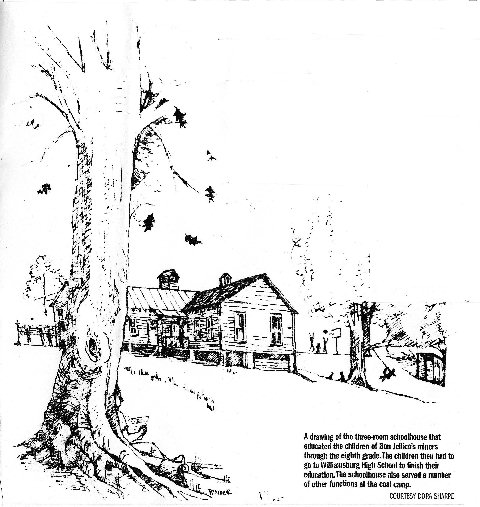 |
By Fred Petke
Staff Writer
The last remnants
of Bon Jellico are fading back into the mountains of southern Whitley
County.
Seventy
years ago, the coal mine closed leaving dozens of families without work
in the midst of the Great Depression. Decades of neglect and vandalism
have left little more than memories of the coal tipple, the three
room school and the 75 four-room homes that stretched around the
base of the camp and the mine.
For
the former residents, memories are all they have left.
"The
house we lived in just burned a couple years ago," said Dora Sharpe,
who was
born in the camp 91 years ago. "There's no houses left. To
me, it was a great place."
Bon Jellico was one of dozens of coal mines
throughout Whitley County during the first half of the 20th century.
The Whitley County Historical and Genealogical Society listed 61 camps
as existing through those first 50 years including French, Blue Gem,
Cumberland River Coal and Oil, Pocono and Patterson Creek employing
anywhere from 15 to 200 people.
|
Sharpe's father M.G. "Melt" Lovitt was one of the first employees
at the mine and operated the mine cars up and down the hill for more than 30
years.
Ivan Bunch spent 10 years living in the camp as a child. His
was a mining family. His father Lewis ran the cutting machine in the mines. His
grandfather was the blacksmith. Four other uncles were miners, too.
"It was not the good old days," Bunch said.
Miners were only paid a couple dollars a day in coal company
scrip, which was expected to be used in the company's commissary, Bunch said.
Pricers were higher at the company store than in town, he said, and his father
lost one mining job because he was trading his scrip in town. |
Families
rented their homes from the company as well for $1 per room per month.
They paid $2 a month to the company doctor, which covered all medical
expenses, he said. Those who went down in the mine also had to buy
their own carbide for their lamp for about five cents a day.
Sharpe's family included seven siblings, which crowded into
one of the company homes. There was a water pump for every five homes, she said.
"Most families had a cow and raised hogs and chickens," Bunch
said, to supplement what food they could buy.
There was also a three-room school in the camp for primer through
the eighth grade, with classes split between the three rooms. It wasn't always
Bunch's favorite place to be.
"I was super hyper," he said. "My medication was a hickory
switch. I usually caught it once a day."
Sharpe went through the camp school, Williamsburg High School
and Cumberland College before returning to the camp to start her teaching career.
Five of her other siblings eventually became teachers as well, she said. |

M.G. Melt's home at the Bon Jellico coal camp was the first of 75 homes
built and the last one to be demolished, his daughter Dora Sharpe said. |
It
was a very hard way of life.
Bunch went barefoot from May until the first frost in the fall.
He had two pairs of overalls: a good pair for school and a second pair to play
in.
"That's life. We didn't know any different," he said.
Church was a traveling preacher who came to the camp school.
Entertainment was usually watching the camp baseball team play on the weekend,
he said.
By the time World War II broke out, Whitley County's coal mines
started to play out. One by one, the mines closed and the camps did the same.
"Most of the mines in Whitley County worked the Jellico seam
of coal," Bunch said. "It was a pretty fair seam but it worked out around World
War II."
Bunch's family moved into town when he was 10 and his father
started working at the Mountain Ash mine. Sharpe's family bought their home and
stayed there for a while longer.
The mine shut down in 1937 when they pulled up the tracks to
the mine," Bunch said.
For many decades following the closure, those who worked, played
and lived at Bon Jellico returned to Williamsburg every Labor Day for a reunion.
Pictures were posted at the picnic shelter where the camp once stood. Stories
were shared and memories lived on.
In recent years, the reunions have ceased. Those who remember
cling to those memories.
"To me, it was a great place," Sharpe said. |
|
Back Next

Census History Employees Families Schools Church
Life in Old Bon Jellico Memories Photos
Homecomings
News Tidbits Surname Registry Brick Wall Queries Links
Guestbook What's New Contact
Us
© 2007-present Remembering
Bon Jellico. All files on this website are copyrighted by their submitter and creator. They may be linked to, but may not be reproduced on another website or in any other form, without specific permission of
the submitter, owner, publisher and this site moderator. Although public records are as such not copyrightable, the manner in which they are presented, including the notes, comments, etc. are. The information on this site is provided free of charge, by volunteers, for your personal use
only.
|